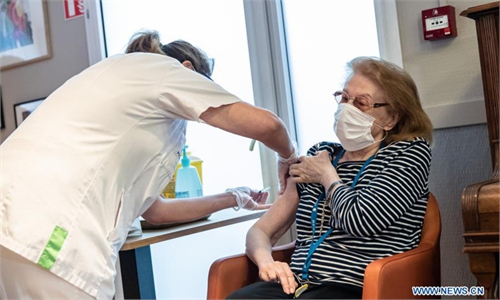Pfizer vaccine’s clinical trials in pregnant women trigger controversy over health risks and ethics

An illustration shows vials of a COVID-19 vaccine and syringes with the logos of US pharmaceutical company Pfizer and German partner BioNTech. Photo: AFP
News that Pfizer-BioNTech is enrolling pregnant women for clinical trials of its COVID-19 vaccine triggered discussions in China on whether pregnant women should be included in such trials.
Some Chinese health experts believe it's too risky and pregnant women should not get any vaccination for trials, while some said the health risks of pregnant women getting vaccinated are much lower than after contracting the virus.
Pfizer-BioNTech said Thursday that it is beginning clinical trials in pregnant women for its COVID-19 vaccine, and is attempting to enroll about 4,000 pregnant women as volunteers from countries like the US, Brazil, Canada, Chile, Mozambique, Spain and the UK. Volunteers should be over 18 and are 24 to 34 weeks into their pregnancy, according to US media reports. Researchers will monitor any side effects, including miscarriage.
The US Centers for Disease Control and Prevention recommends pregnant women and part of a group recommended to receive COVID-19 vaccine, such as healthcare personnel, although only limited data is available on the safety of COVID-19 vaccines administered during pregnancy.
Pregnant women are at increased risk of severe illness from COVID-19, including illness that results in ICU admission, mechanical ventilation, and death compared to non-pregnant women of reproductive age, according to the US CDC.
In China, pregnant women are not recommended to receive COVID-19 vaccines, and other vaccines are also generally not recommended for them due to limited research data, Wang Huaqing, the chief immunologist at the Chinese Center for Disease Control and Prevention, said at a press conference in December 2020.
Pfizer's clinical trials for pregnant women gained much attention from Chinese netizens. Many of them questioned whether it's ethical to run tests on pregnant women especially when the death incidents in some Western countries involving elderly people have raised wide concern on the safety of the Pfizer vaccine.
"It's violating human rights and unethical to have pregnant women for such tests, and don't use science as your excuse," a netizen said.
Yang Zhanqiu, a virologist at Wuhan University, told the Global Times on Friday that pregnant women should not be included in such trials as they are generally not recommended to get any kind of vaccinations due to a high risk to them.
He said pregnant women should get COVID-19 vaccines after delivery.
However, Feng Duojia, president of the China Vaccine Industry Association, told the Global Times on Friday that the risk of possible side effects of COVID-19 vaccine for pregnant women is much lower than the health risks posed after they get infected with the virus, and pregnant women should be among the priority groups to be protected by COVID-19 vaccines.
He said although China is not recommending pregnant women get vaccinated out of caution, they would receive the vaccines after results of related clinical trials prove efficacious, and Chinese vaccine developers are likely to conduct clinical trials for the group in the future.
So far, Sinovac's CoronaVac plans to extend trials to children and pregnant women in Brazil, Brazilian health officials said in January after the Phase III trial of Sinovac's COVID-19 vaccine in Brazil proved 100 percent effective in preventing severe and moderate infections, and 77.96 percent effective in preventing mild cases.




